World War II
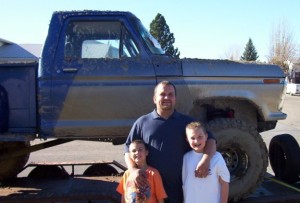 I’m not really sure what the draw is, to getting down and dirty, but there are certainly a lot of people who like to take part in the muddy things of life…like mud trucks, mud wrestling, and muddy 4-wheeling. Maybe it is just the uninhibited, totally down and dirty experience they like, and maybe once you try it, it becomes easy to get hooked on, but I simply can’t imagine it. There are, however, several people in my family, and possibly lots more that I don’t know about, who really love to get in the mud and get dirty.
I’m not really sure what the draw is, to getting down and dirty, but there are certainly a lot of people who like to take part in the muddy things of life…like mud trucks, mud wrestling, and muddy 4-wheeling. Maybe it is just the uninhibited, totally down and dirty experience they like, and maybe once you try it, it becomes easy to get hooked on, but I simply can’t imagine it. There are, however, several people in my family, and possibly lots more that I don’t know about, who really love to get in the mud and get dirty.
My son-in-law, Kevin Petersen and my grandsons, Chris and Josh Petersen, loved it when he had a mud truck. They would enter it in the local and even some in other areas of the state, mud truck competitions. The idea here, as you probably know, is to try to drive your truck as far through a mucky mud hole as you can. Obviously, the truck that goes the furthest is deemed the winner. Kevin loved doing that. Winning the competition here isn’t the whole idea, although it is a big part. Nevertheless, even if he didn’t win, he had a great muddy time trying. You see…to me that simply meant having to bring your truck home and wash all that mud off again, but that didn’t matter to Kevin. It was all about the mud and getting down and dirty. If your truck wasn’t covered in mud when you were done, you didn’t try hard enough.
For some like my grand nephew, Brian Kountz, it was all about 4-wheeling. If there was a mud puddle in his way, he didn’t go around it, although when 4-wheeling, he could have. No, he had to go through it, and if he got stuck, then it was time to get out and dig through the mud in an effort the free the very stuck truck. Brian never backed down from that battle. It was man against mud, and while the mud often won, it was not for a lack of fighting it on Brian’s part. That is probably why his Bronco didn’t really stand a chance in life. Broncos were made for 4-wheeling and mudding, as far as Brian was concerned, and that was how he intended to use his. My husband, Bob used to say, “That kid is gonna kill that Bronco someday.” And Brian did, in the end, but he had an awesome time doing so.
As for my Uncle Bill Spencer…well, who needed a car or truck to get down and dirty? One time during World War II, he and some friends were taking a break from the shipyard war work they did, to go on a picnic and do a little swimming. Needless to say, that picnic turned into a mud fight…boys and girls too. No one was safe in that battle either. If the girls thought they weren’t going to be pulled into the mud, they were real wrong. Uncle Bill says that by the time they were done, they were covered in black, slimy mud from head to toe. He wanted to get a picture of everyone, but most of them decided that they didn’t really want to save that moment, only to be haunted by their childishness every time those pictures were brought out. Uncle Bill didn’t care. The rest washed off, and got in the picture with a muddy Uncle Bill, so he could at least document the players.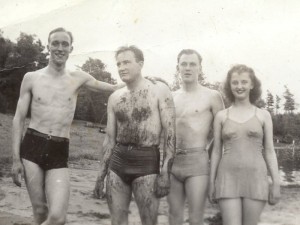
I guess getting down and dirty isn’t such an odd thing to do. In reality, everyone needs a good way to de-stress sometimes, and something as unconventional as a mud fight or even a food fight might just do the trick…provided I don’t have to clean it up. For many people, it is a way of letting off steam, and doing something that is totally hilarious and even a little crazy. To those people, I say “more power to ya.” I’m not sure I would ever like dong that, but then I haven’t done everything in life yet, so…who knows, maybe I’d like it too. Time will tell, I guess.
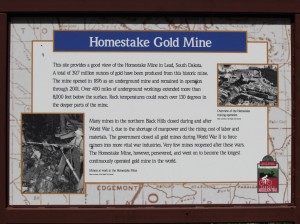 As Bob and I were on our walk on the Mickelson Trail last week, we came across an informational sign on the Homestake Mine. I was really quite surprised as some of the information it contained. Of course, I had read about the discovery of gold in the Black Hills of South Dakota…who hadn’t. The exact date of the discovery is unknown, but the discovery brought many people to the Black Hills…which was in direct violation of the treaty with the Lakota and Cheyenne Sioux Indians. That discovery also brought about the Great Sioux War of 1876…also known as the Black Hills War. Most people will remember that it was during this war, that George Armstrong Custer made his last stand at The Battle of The Little Big Horn.
As Bob and I were on our walk on the Mickelson Trail last week, we came across an informational sign on the Homestake Mine. I was really quite surprised as some of the information it contained. Of course, I had read about the discovery of gold in the Black Hills of South Dakota…who hadn’t. The exact date of the discovery is unknown, but the discovery brought many people to the Black Hills…which was in direct violation of the treaty with the Lakota and Cheyenne Sioux Indians. That discovery also brought about the Great Sioux War of 1876…also known as the Black Hills War. Most people will remember that it was during this war, that George Armstrong Custer made his last stand at The Battle of The Little Big Horn.
The Homestake Mine, near Lead, South Dakota, was founded in 1876 and while it changed hands several times, it was in operation until all the gold mines were mandatorily shut down to encourage the miners to work in more important fields to help with the war effort in World War II. The thing that surprised me the most was that most of the gold mines did not reopen after the war was over. Gold is such a valuable metal, so why would the mines not reopen? One thought comes to mind. Gold was mined underground, sometimes deep underground, as in the case of the Homestake Mine. Underground mining is dangerous as we have seen over the years, with cave-ins and blasts from the gases that can be found there. I have to wonder if the men decided that the new skills they had learned during World War II were a better way to make money and maybe, stay alive.
Nevertheless, the Homestake mine was one that reopened after the war, and then went on to continue to be a successful mine until their last production of ore in 2001. The Homestake Mine ceased production at the end of 2001, due to low gold prices, poor ore quality, and high costs. The Homestake Mine Company had merged with The Barrick Gold Corporation and they were dewatering the mine as DUSEL negotiations continued. This was a slow process and very expensive at $250,000 per month. The mining company was having great difficulty justifying the cost, and the process ceased on June 10, 2003 and the mine was closed completely.
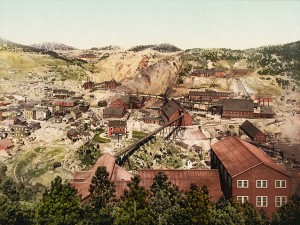
These days, there are a number of operating gold mines around the country, but the state with the largest production of gold is Nevada. The need and desire for gold did not cease after World War II, it was probably just more that a lot of mines didn’t produce the quality or quantity that was really needed to be successful. It almost seems as if the closure of the mines in World War II had a greater impact than anyone would have ever expected. Whatever her end was, the Homestake was not a casualty of the World Wars, and went on to become the longest continuously operating gold mine in the world.
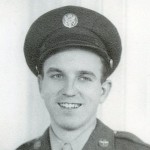 My children and grandchildren have always known that my dad fought in World War II, but I find that maybe they don’t fully know what his part was, or how I feel about it. That is not surprising when you think about the fact that my children, grandchildren, and indeed, even my sisters and I, were not even born when all that took place seventy years ago today. I am pleased that my grandchildren know that their great grandpa fought in World War II, because that tells me that we who are older and at least know about that time in history, have done our jobs, in teaching this youngest generation of our family about the history their family was involved in…pretty well anyway. I was also very proud of my grandson, Chris, because he was interested enough to ask the questions he did about his great grandpa’s service years.
My children and grandchildren have always known that my dad fought in World War II, but I find that maybe they don’t fully know what his part was, or how I feel about it. That is not surprising when you think about the fact that my children, grandchildren, and indeed, even my sisters and I, were not even born when all that took place seventy years ago today. I am pleased that my grandchildren know that their great grandpa fought in World War II, because that tells me that we who are older and at least know about that time in history, have done our jobs, in teaching this youngest generation of our family about the history their family was involved in…pretty well anyway. I was also very proud of my grandson, Chris, because he was interested enough to ask the questions he did about his great grandpa’s service years.
This morning, my grandson Chris sent me a text, tip toeing a bit, because he didn’t know how I 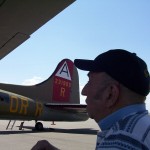 would feel talking about this part of me Dad’s life, and asked me if my dad was involved in the D-Day maneuvers. I immediately told him that I was very proud of the part my Dad had played in World War II, and that his squadron had provided air cover as the troops stormed the beaches of Normandy. I sent him the links to other stories I had written about my Dad’s World War II service years, and he was amazed at all his great grandpa had done. I know how he feels. The first time I was told about all the things my dad had done, I was amazed too…and very proud.
would feel talking about this part of me Dad’s life, and asked me if my dad was involved in the D-Day maneuvers. I immediately told him that I was very proud of the part my Dad had played in World War II, and that his squadron had provided air cover as the troops stormed the beaches of Normandy. I sent him the links to other stories I had written about my Dad’s World War II service years, and he was amazed at all his great grandpa had done. I know how he feels. The first time I was told about all the things my dad had done, I was amazed too…and very proud.
There are a number of men, and maybe even women, in our family who served their country in World War II, and were involved in D-Day maneuvers, and each one is a hero in my eyes. This was such an important day in our history, as was the war it was a part of, and I would hate to think that our grandchildren and great grandchildren would never know of the sacrifice those brave men  made. I would hate to think that the heroes of this and other wars would be forgotten by a nation too busy with their own lives and interests to take the time to look back in history and see for themselves exactly what took place. I know many people find history to be dull, dry, and boring in school, but as we age, and experience a few wars, weather events, earthquakes, and other changes in our nation, we realize that maybe we really need to take a look back and see just how we came to be the great nation we are…and remember the sacrifices made by so many to get us where we are today. I want to thank all the men and women who took part in D-Day, World War II, and all the other wars our nation has been a part of. We are great because of God and you!!
made. I would hate to think that the heroes of this and other wars would be forgotten by a nation too busy with their own lives and interests to take the time to look back in history and see for themselves exactly what took place. I know many people find history to be dull, dry, and boring in school, but as we age, and experience a few wars, weather events, earthquakes, and other changes in our nation, we realize that maybe we really need to take a look back and see just how we came to be the great nation we are…and remember the sacrifices made by so many to get us where we are today. I want to thank all the men and women who took part in D-Day, World War II, and all the other wars our nation has been a part of. We are great because of God and you!!
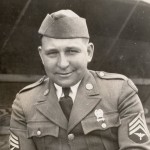 My dad, Aunt Laura, Uncle Bill, and Aunt Ruth had a half brother, of whom I was barely aware until recent years. I think I had heard about him, but somehow it really didn’t register in my mind, but rather seemed like someone who was somehow connected to someone else. While going through my dad’s pictures, we came across a picture of a man named Norman. We were pretty sure this was Dad’s half brother, and then when I was looking through my Uncle Bill’s family history books, our suspicions were confirmed. He looks like a very nice man, and I became very curious about him. I began researching him on Ancestry.com, and found that there was relatively little information, or at least that I could be sure of by documentation. I knew that he was born on May 25, 1906 in Flambeau, Wisconsin, and that he passed away on October 26, 1977 in Richmond, Virginia. Since his birthday was coming up, I decided that I wanted to showcase him for his birthday…but, it was looking like it was going to be a very short story. I decided to ask some of the people on the Spencer Historical and Genealogical Society’s Facebook page to see if they could help. What an amazing idea that turned out to be. I quickly got a response from David Lawrence, and he had a wealth of information to give me.
My dad, Aunt Laura, Uncle Bill, and Aunt Ruth had a half brother, of whom I was barely aware until recent years. I think I had heard about him, but somehow it really didn’t register in my mind, but rather seemed like someone who was somehow connected to someone else. While going through my dad’s pictures, we came across a picture of a man named Norman. We were pretty sure this was Dad’s half brother, and then when I was looking through my Uncle Bill’s family history books, our suspicions were confirmed. He looks like a very nice man, and I became very curious about him. I began researching him on Ancestry.com, and found that there was relatively little information, or at least that I could be sure of by documentation. I knew that he was born on May 25, 1906 in Flambeau, Wisconsin, and that he passed away on October 26, 1977 in Richmond, Virginia. Since his birthday was coming up, I decided that I wanted to showcase him for his birthday…but, it was looking like it was going to be a very short story. I decided to ask some of the people on the Spencer Historical and Genealogical Society’s Facebook page to see if they could help. What an amazing idea that turned out to be. I quickly got a response from David Lawrence, and he had a wealth of information to give me.
He told me that Norman was married to a woman named Elizabeth, but it didn’t appear that they ever had children. He mentioned that he had been stationed in Oahu, Hawaii in World War II. Then he said that he had worked for the Virginia State Police as a radio technician in 1850. I had found Uncle Norman’s grave on FindaGrave.com a while back, and a reference to Elizabeth that I couldn’t confirm on Ancestry.com. This all gave me new motivation to find out more. I first went to FindaGrave.com and found Elizabeth’s grave, but all it said was Elizabeth H…no last name, and called her, simply his wife. I found that a bit odd, but then I started thinking about the Virginia State Police, and decided that maybe I could get more information by calling them. This also turned out to be an amazing idea. I was quickly connected to the Human Resource Records Department, and within just a few minutes they read me all of the information on my uncle’s employment card…and there was more that just his employments history. His parents names, which I already knew, were listed, but also Elizabeth’s last name, which was Hoover. They had his service years, August 25, 1925 to March 31, 1950, when he retired at the rank of captain. They also had, of course, his employment years, August 17, 1953 to June 1, 1971, when he retired at the age of 65. I couldn’t believe all this information had come my way, by simply reaching out to two key sources. It was an exciting day indeed.
I was curious as to what Uncle Norman might have done as a radio technician, so I did some research on that occupation and found that they design, set up, operate and maintain equipment and radios used for transmitting. This tells me that he probably worked on s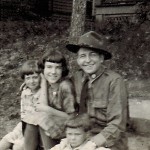 ystems for broadcasting information to and from the police officers of the Virginia State Police. I’m quite sure that the equipment he worked on back then would almost seem like a home built ham radio these days, compared to the equipment the police departments use today, and in todays world, his job might be a mix of those old radio technicians, and the work my cousin, Tim Fredrick, who is a half grand nephew of Uncle Norman’s, if I have my terminology right. I’ll bet he saw a lot of changes in that industry over his years of being involved in it. I wish I could have talked to him about it, but that was not to be. Today would have been my Uncle Norman’s 108th birthday. I’m really sorry I never got to know him, but happy birthday in Heaven Uncle Norman.
ystems for broadcasting information to and from the police officers of the Virginia State Police. I’m quite sure that the equipment he worked on back then would almost seem like a home built ham radio these days, compared to the equipment the police departments use today, and in todays world, his job might be a mix of those old radio technicians, and the work my cousin, Tim Fredrick, who is a half grand nephew of Uncle Norman’s, if I have my terminology right. I’ll bet he saw a lot of changes in that industry over his years of being involved in it. I wish I could have talked to him about it, but that was not to be. Today would have been my Uncle Norman’s 108th birthday. I’m really sorry I never got to know him, but happy birthday in Heaven Uncle Norman.
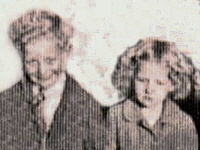 My Uncle Larry was well known to his family and his friends for being a real joker. He loved to tell jokes and make people laugh. He was also very handy with tools. He loved working on all kinds of things, from cars to carpentry. One time he was looking for one of his tools…specifically, his hammer, and couldn’t find it. He looked everywhere, and finally, when he could think of no other way to find it, he sat down on the floor by the cat, and asked, “Kitty…Whar’s the Hommer?” It was said in a joking way, but apparently, the kitty knew more than Uncle Larry expected. Of course, the kitty didn’t really know anything, but when Uncle Larry looked down…there beneath in a crack in the floorboards, was the hammer. I’m sure it was a surprise to Uncle Larry, because he didn’t think he would find it, but in a moment of resignation, he found it because of a silly question.
My Uncle Larry was well known to his family and his friends for being a real joker. He loved to tell jokes and make people laugh. He was also very handy with tools. He loved working on all kinds of things, from cars to carpentry. One time he was looking for one of his tools…specifically, his hammer, and couldn’t find it. He looked everywhere, and finally, when he could think of no other way to find it, he sat down on the floor by the cat, and asked, “Kitty…Whar’s the Hommer?” It was said in a joking way, but apparently, the kitty knew more than Uncle Larry expected. Of course, the kitty didn’t really know anything, but when Uncle Larry looked down…there beneath in a crack in the floorboards, was the hammer. I’m sure it was a surprise to Uncle Larry, because he didn’t think he would find it, but in a moment of resignation, he found it because of a silly question.
Uncle Larry was my mom’s best friend as a child. Just two years older than she was, they did a lot of things together. One time, Uncle Larry bought an old car…a junker. He 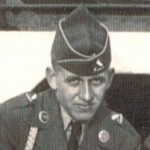 worked on the car, fixing it up, with great plans for it in the future. That morning, he decided to take the car to school, and give his sister, Collene, my mother a ride while he was at it. They figured out pretty quickly that the brakes on the car probably needed more help than the engine had needed. Now they were driving down the road, had no way to stop. For me, this story brought visions of Fred Flintstone putting his heels to the pavement in an effort to stop quickly. Of course, reality is much different. According to my mom, her brother pulled off an amazing feat…swerving around every obstacle until he could finally get the car slowed down enough to coast to a stop. I can imagine that Uncle Larry was extremely relieved that he and his sister were not going to be in an accident. Accidents can be so scary, and it doesn’t take much of an impact to cause injury. I’m sure that my Uncle Larry was very thankful, but my mom was very proud of him. His driving was amazing according to her.
worked on the car, fixing it up, with great plans for it in the future. That morning, he decided to take the car to school, and give his sister, Collene, my mother a ride while he was at it. They figured out pretty quickly that the brakes on the car probably needed more help than the engine had needed. Now they were driving down the road, had no way to stop. For me, this story brought visions of Fred Flintstone putting his heels to the pavement in an effort to stop quickly. Of course, reality is much different. According to my mom, her brother pulled off an amazing feat…swerving around every obstacle until he could finally get the car slowed down enough to coast to a stop. I can imagine that Uncle Larry was extremely relieved that he and his sister were not going to be in an accident. Accidents can be so scary, and it doesn’t take much of an impact to cause injury. I’m sure that my Uncle Larry was very thankful, but my mom was very proud of him. His driving was amazing according to her.
When Uncle Larry was older, he decided to go to work in Bemidji, Minnesota in a mine there. With World War II going on at the same time, the family found out that he had been drafted. They had no way to contact him, so it was decided that my mom, and her fiancé, my dad, and Dad’s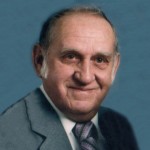 sister, Ruth would drive up to Bemidji to let him know that he had to come home, and prepare to go to fight in the war. They went up there, but couldn’t find him right away. He had gone into town. Eventually they found him and headed back home to Casper, so that he could go and fight for his country. I’m sure that was a bittersweet trip for my mom, who was now unsure of his future. Thankfully, Uncle Larry came home from the war, and went on to become the wonderful husband, father, grandfather, and uncle that he was to us, as well as the great brother and son he had always been. Today Uncle Larry would have been 80 years old. Happy birthday in Heaven, Uncle Larry. We love and miss you very much.
sister, Ruth would drive up to Bemidji to let him know that he had to come home, and prepare to go to fight in the war. They went up there, but couldn’t find him right away. He had gone into town. Eventually they found him and headed back home to Casper, so that he could go and fight for his country. I’m sure that was a bittersweet trip for my mom, who was now unsure of his future. Thankfully, Uncle Larry came home from the war, and went on to become the wonderful husband, father, grandfather, and uncle that he was to us, as well as the great brother and son he had always been. Today Uncle Larry would have been 80 years old. Happy birthday in Heaven, Uncle Larry. We love and miss you very much.
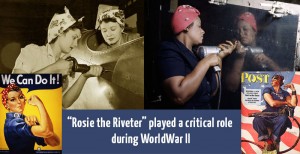 During World War II, when many of the men were involved in the fighting over seas, a group of women stepped up and filled the gap as welders working in the bomber plants. They became known as Rosie the Riveter, and there were thousands of them. It really became a movement of female empowerment, and I don’t know how the war would have gone without them. It was a movement of solidarity. They worked to keep the American Army Air Forces in much needed bombers. There were men who were riveters too, including my Uncle Bill Spencer, who was turned down for the service because of flat feet and a hernia, but most of them were women, and they
During World War II, when many of the men were involved in the fighting over seas, a group of women stepped up and filled the gap as welders working in the bomber plants. They became known as Rosie the Riveter, and there were thousands of them. It really became a movement of female empowerment, and I don’t know how the war would have gone without them. It was a movement of solidarity. They worked to keep the American Army Air Forces in much needed bombers. There were men who were riveters too, including my Uncle Bill Spencer, who was turned down for the service because of flat feet and a hernia, but most of them were women, and they 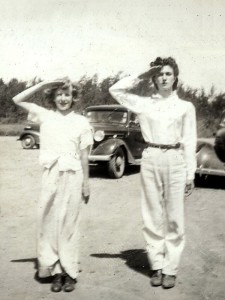 included my Aunt Laura Spencer and my Aunt Ruth Spencer. It was a time when it was all hands on deck…our fighting airmen needed our help and support. One of those fighting airmen was my dad, Allen Spencer, brother to Laura, Bill, and Ruth. I’m sure it seemed to them, the best way they could help their brother, and all the other airmen.
included my Aunt Laura Spencer and my Aunt Ruth Spencer. It was a time when it was all hands on deck…our fighting airmen needed our help and support. One of those fighting airmen was my dad, Allen Spencer, brother to Laura, Bill, and Ruth. I’m sure it seemed to them, the best way they could help their brother, and all the other airmen.
The other day, I came across an article in the paper about the Willow Run bomber plant in Willow Run, Michigan. It would seem that this little slice of history is set to go on the chopping block. I suppose that not every historic landmark can be saved, but it seems such a horrible shame to tear down a building that marked such a heroic effort by so many people, to stand behind a nation at war, by meeting such an enormous need. Between 1942 and 1945, crews numbering tens of thousands built roughly one B-24 Liberator an hour…8,685 in all. There were women all over the country performing the work that had always been done by men, but at the Willow Run plant, one Rose Will Monroe worked alongside 40,000 other workers…mostly women…and soon she became the trademark…Rosie the Riveter. Before long, 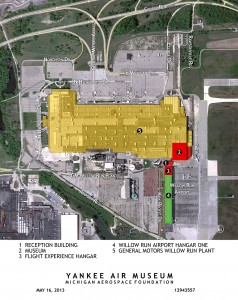 all those women were known as Rosie the Riveters…and they considered it an honor to bear the title.
all those women were known as Rosie the Riveters…and they considered it an honor to bear the title.
Now, the Willow Run bomber plant is in peril. Those who remember the trademark Rosies, want to keep their history alive, but in order to do so, they need 8 million dollars. They don’t have much time to raise the money. They are at a remarkable 7.23 million dollars right now. To me it would be a horrible shame to let this little slice of history be destroyed. I feel like it is so uncharacteristic of this nation to forget the efforts of our heroes in any area of American life. It is my hope that this historic landmark can be saved, so that our children, and our children’s children can see what can be accomplished when we work together. More information on this can be found at Save The Willow Run Bomber Plant.
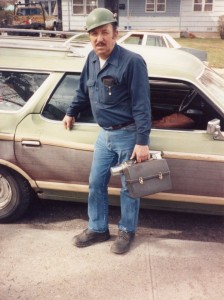 My dad was a hard working man, really from the time he was a kid. He helped out on the farm when he was a young man, then when he moved to California at 17 years of age, he did the work of a grown man, while he was still the age of a boy. That work ethic was something he learned growing up and it never left him. Through World War II and beyond as he moved around the country, while deciding where he wanted to live, he always had a job. He believed that work, any kind of work was a noble undertaking, and he did every job to the best of his ability.
My dad was a hard working man, really from the time he was a kid. He helped out on the farm when he was a young man, then when he moved to California at 17 years of age, he did the work of a grown man, while he was still the age of a boy. That work ethic was something he learned growing up and it never left him. Through World War II and beyond as he moved around the country, while deciding where he wanted to live, he always had a job. He believed that work, any kind of work was a noble undertaking, and he did every job to the best of his ability.
When I was a little girl, he was working at a job that took him out of town sometimes. I really hated that particular job. I didn’t want my daddy to leave to go out of town all the time. It wasn’t that I was so young that I didn’t remember him when he got back, because I did, it was that I missed him so much that I could hardly stand it. I just didn’t think daddies should go out of town. He was supposed to be at home, with his family. I can’t say that the years have changed my opinion on that idea either, although I do understand that sometimes men have to go out of town for work. That is just the way things are sometimes. I just didn’t understand that as a child.
One time after Dad left to go out of town, I got sick. My stomach ached, and I just didn’t feel well, in general. Mom put me to bed and took care of me, as you would expect a mommy to do, and since it was nothing serious, there was no need to go to the doctor. We figured it was just a flu bug, and it would go away in a couple of days…and so it did, but not in the way you would expect. It was the strangest thing, but the minute my daddy got home, everything was fine, and I had not been faking illness either. This was similar, I suppose to being homesick, 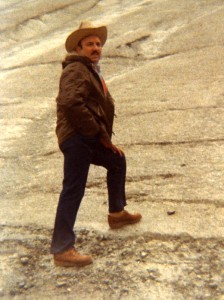 only in reverse. I wanted my daddy home so badly that I felt homesick for him. I was so happy when he came home. Everything was right again. Our family was all together again.
only in reverse. I wanted my daddy home so badly that I felt homesick for him. I was so happy when he came home. Everything was right again. Our family was all together again.
Dad was always the hero to his daughters. We knew that no matter what happened, Dad could fix it. That was just the way it always was. Dad was a problem solver, and his presence in our lives always made us feel stable and complete. We were always Daddy’s Girls…all of us, including Mom. And he always made us feel like we were his princesses. I guess that was why having him gone, out of town for work, or now, in Heaven, makes this world feel like something just isn’t right. And it isn’t, because my daddy isn’t here, and I miss him terribly. Today, my dad would have been 90 years old. Happy birthday in Heaven Dad. We love and miss you very much, and we can’t wait to see you again.
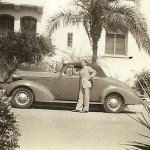 When my dad was a young man, he decided to leave the cold climate of Wisconsin, and move to sunny California to start a new life. He went to work for Douglas Aircraft, and he did very well there. He probably would have stayed there had World War II not intervened. I sometimes wonder how his life might have been different had he stayed there, or had he gone back there after the war. Would he have met my mom, and if so, would we have all lived in California. I can’t say that I am sorry that his life took the path that it did, because it made him the man who became my dad. His path shaped who he was and who we all became, and that is just fine with me. I don’t think I would have wanted to be anywhere else really, even though I sometimes wish I lived somewhere warm.
When my dad was a young man, he decided to leave the cold climate of Wisconsin, and move to sunny California to start a new life. He went to work for Douglas Aircraft, and he did very well there. He probably would have stayed there had World War II not intervened. I sometimes wonder how his life might have been different had he stayed there, or had he gone back there after the war. Would he have met my mom, and if so, would we have all lived in California. I can’t say that I am sorry that his life took the path that it did, because it made him the man who became my dad. His path shaped who he was and who we all became, and that is just fine with me. I don’t think I would have wanted to be anywhere else really, even though I sometimes wish I lived somewhere warm.
Nevertheless, as I look at some of the pictures of him at that time, a thought forms in my mind. My dad looks like a Hollywood Producer…or at least what I picture a Hollywood Producer looking like at that time in history. He is standing next to a modern automobile…at least it was then, and wearing a nice suit…much like I would expect a Hollywood Producer of that era to be wearing. I don’t know what event my dad was going to, or if he was just dressed up so he could get a good picture to show off his car, but I do know that he looked real classy. As I have looked through the old pictures my dad had, the pictures from California were very intriguing to me. California is probably the least like my dad’s personality of any state in the United States. He always liked the mountains and the rural areas of the country. That is something I agree with. I love the mountains, and I don’t like congested areas. So, what had drawn him to California?
It is rather strange for me to think of my dad living in California. It seems so out of character 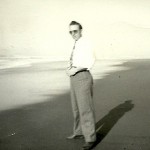 for him, except for the ocean and the Redwoods, both of which he always loved. Other than that, he never was the California type. Nevertheless, California might have been very different then, but I just don’t think it fit his personality. Still, he was a young man then, and I’m sure he was trying out new things, to see who he was and where he wanted to be. Nevertheless, I can’t imagine my dad doing anything but the work he did. During the years he was growing up, he and his brother liked to build things, so mechanical things were more their style, and that along with the welding he learned back then, were his life’s work. He definitely isn’t a Hollywood Producer type, but as they say, “He sure did clean up nice!”
for him, except for the ocean and the Redwoods, both of which he always loved. Other than that, he never was the California type. Nevertheless, California might have been very different then, but I just don’t think it fit his personality. Still, he was a young man then, and I’m sure he was trying out new things, to see who he was and where he wanted to be. Nevertheless, I can’t imagine my dad doing anything but the work he did. During the years he was growing up, he and his brother liked to build things, so mechanical things were more their style, and that along with the welding he learned back then, were his life’s work. He definitely isn’t a Hollywood Producer type, but as they say, “He sure did clean up nice!”
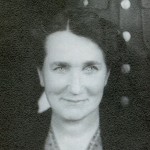 As time marched forward toward the United States entering World War II, many people were afraid for the lives of their sons. My dad’s mother, who had two sons, was among them. Things were really heating up while my dad was working in California, and the family really wanted him come home. The word was that any young men 18 to 20 years of age were going to be deployed by Christmas 1942, putting my dad and my Uncle Bill squarely in that group. It was a fearful time in our country. People didn’t want their sons to go to the war, but they knew that Hitler had to be stopped. The things Hitler was doing were so horrible that everyone knew that he must not be allowed to take any more countries over. He was completely insane and dead set on controlling the whole world. They knew that while the fear of sending their sons into battle was almost more than they could possibly bear, it was also going to be the only way to stop this horrible man.
As time marched forward toward the United States entering World War II, many people were afraid for the lives of their sons. My dad’s mother, who had two sons, was among them. Things were really heating up while my dad was working in California, and the family really wanted him come home. The word was that any young men 18 to 20 years of age were going to be deployed by Christmas 1942, putting my dad and my Uncle Bill squarely in that group. It was a fearful time in our country. People didn’t want their sons to go to the war, but they knew that Hitler had to be stopped. The things Hitler was doing were so horrible that everyone knew that he must not be allowed to take any more countries over. He was completely insane and dead set on controlling the whole world. They knew that while the fear of sending their sons into battle was almost more than they could possibly bear, it was also going to be the only way to stop this horrible man.
The letters from home to my dad in California were filled with worried questions. They had heard rumors of the impending deployment back home in Holyoke, Minnesota, and were desperately hoping that what they heard in that small town was wrong. They questioned my dad, as to why he thought he would be going so soon. Uncle Bill and Dad had both decided 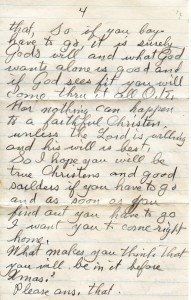 that if one was called to go, the other would join up too. I’m sure they were thinking that if they went together, they could watch each other’s back. In the end, that was not to be, because Uncle Bill had flat feet and a hernia that needed to be repaired. It was a devastating blow to him. He wanted so desperately to be there with his little brother. He had always been there for him, to protect him, and it seemed impossible that he couldn’t do that this time. He was scared for his little brother. He even tried to get him to take welding classes, because he mistakenly thought that my dad wouldn’t have to go if he was working in the shipyards. I don’t know if dad took the classes or not…he did at some point, because he worked as a welder for many years…but if he did, it did no good, because they needed men in the war zones, and that was more important to the country. In the end, he chose the Army Air Force, and went to the war, did his duty to his country and the world, and he lived!!
that if one was called to go, the other would join up too. I’m sure they were thinking that if they went together, they could watch each other’s back. In the end, that was not to be, because Uncle Bill had flat feet and a hernia that needed to be repaired. It was a devastating blow to him. He wanted so desperately to be there with his little brother. He had always been there for him, to protect him, and it seemed impossible that he couldn’t do that this time. He was scared for his little brother. He even tried to get him to take welding classes, because he mistakenly thought that my dad wouldn’t have to go if he was working in the shipyards. I don’t know if dad took the classes or not…he did at some point, because he worked as a welder for many years…but if he did, it did no good, because they needed men in the war zones, and that was more important to the country. In the end, he chose the Army Air Force, and went to the war, did his duty to his country and the world, and he lived!!
For some time now, I thought that the main reason my dad’s letters home were always upbeat and positive was so that he could protect his mother…keep her from worrying about how bad things were. Now, after reading her letters to him, and the letters from his brother and sisters, talking about how worried their mother was, I realized that he wasn’t trying to keep her from worrying…she had already voiced those fears…she was already in the middle of serious worry, and now she was in the middle of praying that her boys wouldn’t have to go, and if they did…please dear Lord, take care of them and bring them home to her!!
It is hard enough to go into battle or to send your son into battle…to deal with the fear in your own heart…much less to know that your soldier was scared…and for the soldier, to know that  your family is scared. Knowing my dad like I do, I know that he was in the process of pushing his fear back, putting his faith in God, and setting his mother’s worried mind at ease. He knew he could not stop what was coming, but the hardest thing to accept was that he couldn’t really stop his mother’s fears…no matter how excited, positive, or fearless he made his letters sound. And, that tore him up more than anything he would face in the war. The days leading up to, and during World War II, were filled with the worries and fears of a nation. The letters to the soldiers and home from the war, were carefully worded so as to try to alleviate the fears that could not be alleviated until the deployed loved ones were home again.
your family is scared. Knowing my dad like I do, I know that he was in the process of pushing his fear back, putting his faith in God, and setting his mother’s worried mind at ease. He knew he could not stop what was coming, but the hardest thing to accept was that he couldn’t really stop his mother’s fears…no matter how excited, positive, or fearless he made his letters sound. And, that tore him up more than anything he would face in the war. The days leading up to, and during World War II, were filled with the worries and fears of a nation. The letters to the soldiers and home from the war, were carefully worded so as to try to alleviate the fears that could not be alleviated until the deployed loved ones were home again.
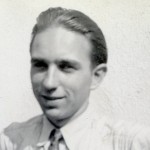 In 1938 to 1939, my dad moved from the family farm, into town so he could attend vocational school. He studied sheet metal fabrication. After he graduated, he moved to Santa Monica, California, at the very young age of just 17 years, and went to work for Douglas Aircraft. Uncle Bill, dad’s brother, let him take his 1934 Plymouth, which broke down on the way there, and Dad had to wire his dad for the money to fix it. It’s pretty had to fix a broken down car, when you are on the way to a new job. Most of us don’t have a lot of money at that point, and after the Great Depression, the country was just starting to come back. This job would begin to move my dad into a position for some of his future jobs, later in life, beginning with his military placement as a Flight Engineer. The Flight Engineer had to know everything about the plane, because it was his job to try to get them back to the base safely…even if something went wrong with the plane. There was no place to pull over when you are flying at 25,000 to 30,000 feet. There was at least one time I know of that Dad was the only reason they came back safely, because the landing gear would not go down. He had to hang upside down in the open bomb bay and crank it down by hand.
In 1938 to 1939, my dad moved from the family farm, into town so he could attend vocational school. He studied sheet metal fabrication. After he graduated, he moved to Santa Monica, California, at the very young age of just 17 years, and went to work for Douglas Aircraft. Uncle Bill, dad’s brother, let him take his 1934 Plymouth, which broke down on the way there, and Dad had to wire his dad for the money to fix it. It’s pretty had to fix a broken down car, when you are on the way to a new job. Most of us don’t have a lot of money at that point, and after the Great Depression, the country was just starting to come back. This job would begin to move my dad into a position for some of his future jobs, later in life, beginning with his military placement as a Flight Engineer. The Flight Engineer had to know everything about the plane, because it was his job to try to get them back to the base safely…even if something went wrong with the plane. There was no place to pull over when you are flying at 25,000 to 30,000 feet. There was at least one time I know of that Dad was the only reason they came back safely, because the landing gear would not go down. He had to hang upside down in the open bomb bay and crank it down by hand.
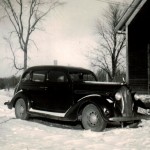
My dad was very good at the work he did for Douglas Aircraft, but on December 7, 1941, everything changed. Dad left California, in the 1936 Plymouth he had bought, and came home just as the United States was entering World War II. His plan, of course, was to join the Army Air Forces. He was a perfect match for the Army Air Forces, because of his knowledge of air craft, and they saw that right away. He was put into training, and placed on a B-17G crew, as the Flight Engineer, and stationed at Great Ashfield, Suffolk, England. His crew left Texas, and flew to New York City, on April 1, 1944, where they refueled and went on to England.
Most crews on B-17G planes had to fly 35 missions before they could come home, but at Great Ashfield, because of how dangerous that area was, they only had to fly 25. My dad ended up flying 26 before he came home. I don’t think his family knew how dangerous that base was, because my dad would not have told them. “The average life of a B-17 bomber at Great Ashfield was just over 4 months. Very few B-17 bombers that were transferred to the base lasted a complete tour of duty. The average Airman lasted 15 combat missions and few completed an entire tour of 25 missions. Much less 35 !!!! The average LIFE of a Ball Turret Gunner in combat was 12 MINUTES.” Knowing that my dad somehow beat those odds, reminds me of  the many miracles in his life. His crew did lose at least one Ball Turret Gunner, and my dad tried everything he could to save his life, but it was no use…he was gone.
the many miracles in his life. His crew did lose at least one Ball Turret Gunner, and my dad tried everything he could to save his life, but it was no use…he was gone.
In later years, Dad would work for Fred Dewell, as a welder and sheet metal fabricator. His training at vocational school and Douglas Aircraft made him an asset to that company. Then Dad went to work for WATCO, building the boxes for Caterpillar trucks. He was one of their best welders, and was remembered by the people who worked there for many years after his retirement. His training as a young man of only 16 years, served him well all of his life, and I have always been very proud of the things he did in his lifetime.

